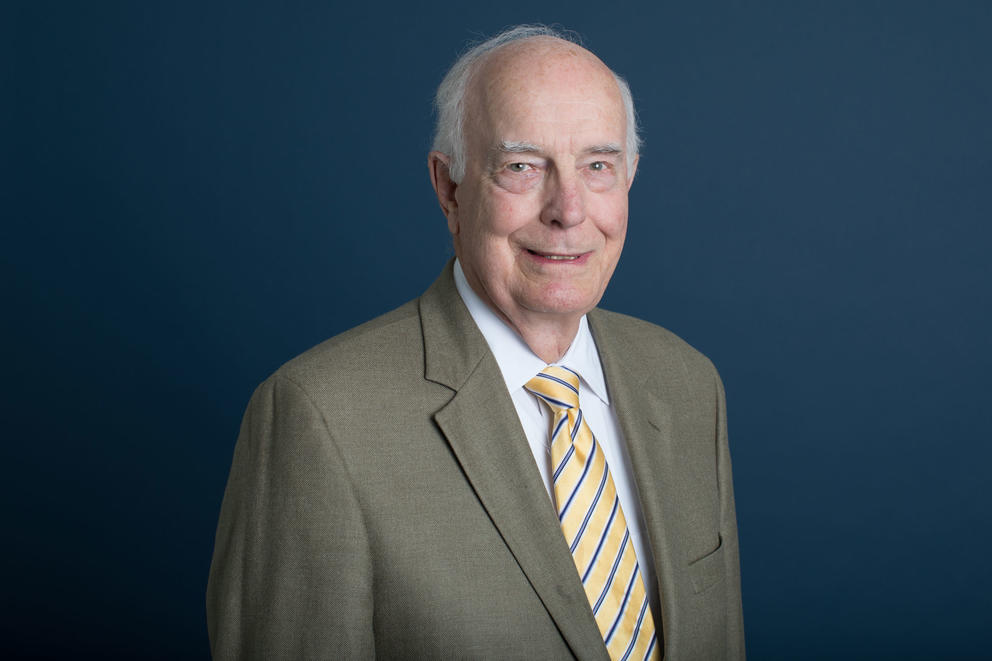Evans had sent the letter to his father in Seattle when he was 27 years old and a Navy lieutenant stationed on a destroyer in the Pacific during the Korean War. The letter began as a Father’s Day tribute, thanking his dad for all he’d done for the family, but soon turned into what Evans calls a “diatribe” against the Korean War and the missteps he felt were being made by the country’s leaders in Washington, D.C.
“I told him that if I was back in Seattle, I would run for the legislature,” Evans says.
None of them knew it then, but he would eventually make good on that statement. Not only would Evans spend nine years in the Washington state House of Representatives, but he would also serve three consecutive terms as Washington state’s governor and spend six years as a U.S. senator.
During that time, the Republican would become known as a supporter of schools, an advocate for a regional transportation system, and a staunch crusader for the environment. He would welcome Vietnam War refugees to Washington state, lobby then-President Gerald Ford to preserve the Alpine Lakes Wilderness area, and help run the far-right John Birch Society out of the GOP.
His independent thinking and willingness to work across the aisle made Evans a national icon for politicians who seek to find common ground. To this day, to be called a “Dan Evans Republican” is a mark of pride for moderate members of the GOP.
For his years of public service, Evans will be honored with Crosscut's 2018 David Brewster Lifetime Achievement Award. Seats and tables for the Courage Awards breakfast can be purchased here.
Early years
Dan Evans grew up in Seattle’s Laurelhurst neighborhood, attended Roosevelt High School and enrolled in the V-12 Navy College Training Program after graduation. He was sent to the Pacific at the end of the World War II and served as an ensign on a succession of aircraft carriers. He returned to the UW at the end of the war and earned an engineering degree, and later a graduate degree, in civil engineering. He went on to work as a structural engineer, and helped design Seattle’s Alaskan Way Viaduct.
“I’ve lived long enough to see a structure I designed be torn down,” he jokes.
Evans had been out of the Navy for several years when he was called to serve in the Korean War. It was then that he sent the Father’s Day missive home that would define the trajectory of the rest of his life.
One of Evans’ first forays into environmental politics was spurred by a concern over the diversion of sewage into Lake Washington brought on by the post-war surge in housing construction. Evans worked alongside the likes of Jim Ellis and the prominent Municipal League to help build an overarching treatment plant to manage the sewage and get the lake cleaned up.
Evans ran for a seat in the Washington State legislature and won, serving in the House from 1957 to 1965. Following in the footsteps of other leaders of the time — both Democrat and Republican — Evans was a staunch crusader for the environment, a passion that was ignited during his Boy Scout days.
“I fell in love with the mountains” during childhood outings in the Olympic National Forest, he says, “and I’ve been hiking and climbing ever since.”
That dedication would continue throughout his political career as governor of Washington (1965-1977) and eventually U.S. Senator (1983-1989). He co-sponsored the Washington State Wilderness Act in 1984, which protected more than a million acres of national forest lands. He was a key figure in creating North Cascades National Park and the scenic corridor in the Columbia River Gorge.
When then Governor Evans learned that the secretary of agriculture was pressuring President Ford to veto a major piece of legislation that would, in part, prevent mining and timber harvesting in a wild, rugged area of the Cascades east of Seattle, he flew to D.C. to speak face to face with his longtime friend. He had tracked down a coffee table book full of photos of the area’s beautiful mountains and alpine lakes and presented it to Ford as part of a personal lobbying effort to convince Ford and his administration to reconsider the plan. Ford was fascinated with the photos and spent 45 minutes poring over the Northwest landscapes. Days later, on July 12, 1976, Ford signed the Alpine Lakes Area Management Act into law, permanently protecting several hundred thousand acres of wilderness.
Last year, in honor of his conservation advocacy, the wilderness area within Olympic National Park was renamed the Daniel J. Evans Wilderness.
Expelling extremism
As Washington’s governor in the mid-1960s, Evans was a driving force in purging the extreme-right John Birch Society from the Republican party while then-presidential nominee Barry Goldwater remained silent on the group and its activities. Evans gave a rousing speech to the Washington state central committee for the Republican Party, setting in motion a chain of condemnations of the radical group from other state parties, Republican governors, and a handful of prominent members of Congress. Evans’ confrontation and public denunciation of the organization stands in stark contrast to President Trump’s refusal to single out the white supremacy movement in the aftermath of last August’s “Unite the Right” rally in Charlottesville, which resulted in violent clashes and the death of one person.
“Extremists of neither the right nor the left contribute to the strength of America or her political institutions. Both feed on fear, frustration, hate and hopelessness,” Evans told the state convention in 1965.
“These were people opposed to civil rights and (Evans) was not going to have them as part of the party,” says Sally Poliak, who was a child in the 1960s but would later go on to serve on Evans’ campaign staff during his time in Washington, D.C. A centrist Republican, she has continued to work as a consultant with Evans on various issues following his time in the U.S. Senate. “He was a very principled man. He had the courage to stand up and make his principles known.”
As a young staffer, Poliak got to know Evans on a professional and a personal level, often driving him to fundraising events. He was, and remains, trustworthy, a good listener, and a man of his word, she says. His willingness to listen has won him friends and supporters across the political spectrum.
“His staff adored him,” says Poliak, who today works as a communications and public affairs consultant in Seattle. “He listened to them and respected them, and they really respected his principles. We all still think of ourselves as ‘Evans people.’”
A supporter of bipartisan principles
Perhaps what most sets Evans apart from lawmakers of today was his understanding that political progress requires bipartisan compromise. Mike Vaska, chairman of the political action organization Mainstream Republicans of Washington, a centrist group that fashions its work after Evans, believes this attitude is common among those of Evans’ generation.
“They all [were involved] in World War II in one form or another,” says Vaska, an attorney at Seattle law firm Foster Pepper and former Crosscut board member. “They came back [from the war] committed to making democracy work, because they saw what happened when it didn’t.”
Vaska tells the story of how Republicans in the state House worked under the radar with a handful of dissident Democrats to oust a mightily disliked speaker — a Democrat named John L. O’Brien — and replace him in the early 1960s. Evans was a member of the legislature at the time. The rift stemmed from a disagreement over the provision of basic utility services, with arguments made over the use of public or private enterprises. After months of tension, this handful of Democrats joined forces with the minority Republicans to pull off the controversial ouster, which led to a bipartisan caucus in 1963.
“That was very unusual at the time,” says Vaska, and stands as an example of Evans and his colleagues coming together for a greater good, despite party lines. “It reflects how Dan operated as a politician. He worked across the aisle.”
That did not mean that Evans always won. While Evans and his allies were successful in pushing through a series of growth propositions called “Forward Thrust,” that would dramatically shape the Puget Sound region, in 1968 critical parts of the initiative failed. Voters shot down a transportation measure that would have funded a regional rapid transportation system. Without voter support, $900 million in federal funding went instead to fund Atlanta’s rapid transit system, leaving our area with a piecemeal approach to transportation projects.
Evans also fought unsuccessfully for a state income tax, which was one part of a much larger tax reform package. He calls this effort, defeated twice by voters, the “biggest disappointment” of his political career.
Still at it
Although Evans has been retired since 1989, when he decided not to run for re-election to the senate, he has remained involved.
“I haven’t left politics,” he says, “I just left political office.”
He puts considerable effort into mentoring young legislators, whom he sees as “an investment in our future.” He’s motivated by the talent he sees and is optimistic that lawmakers will once again be able to work with each other toward common goals.
“I hope for a kind of government where people listen to and work with each other,” he says. “Accomplishing good things takes bipartisan effort, because often what we’re trying to accomplish isn’t partisan.”
Evans also spends his days watching his nine grandchildren grow up and attending their high school and college graduations. He and his wife Nancy remain active within the UW’s School of Public Policy and Governance, which was named after Evans in 1999. Both are involved in the campaign to raise $50 million to remodel the public affairs graduate school.
Evans credits much of his professional success to Nancy, whom he says has always supported his many transitions, despite the unpredictability that often accompanies a life in politics.
“Whenever we encountered a change, I’d always go to her and say, ‘Is this something we want to do?’” says Evans. “And she always said, ‘You do what your heart tells you.’”
Courage Award winners are nominated by the community and selected by an independent panel of community leaders. To learn about all of the 2018 winners, click here.
2018 Courage Awards are sponsored by:




